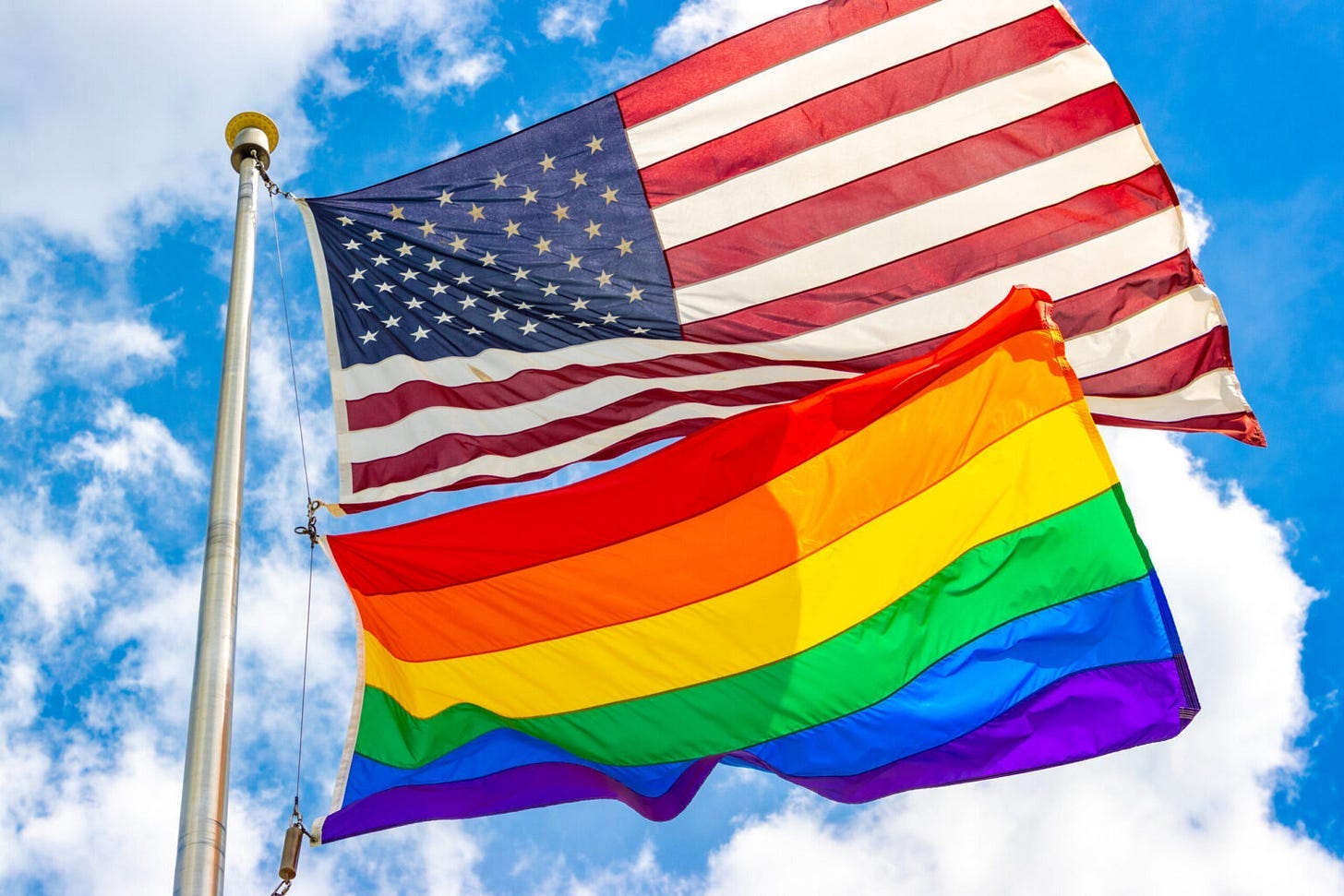Supreme Court Dives Back Into Culture Wars, Taking Up Idaho, West Virginia Transgender Sports Bans
More than half of U.S. states have enacted laws barring trans athletes from participating in girls' and women’s sports.

This story has been updated.
By Gary Gately
Plunging back into the nation’s culture wars, the U.S. Supreme Court has agreed to take up two cases on whether states can ban transgender athletes from competing on girls’ and women’s sports teams.
Thursday’s decision to review lower court rulings that barred enforcement of such bans in Idaho and West Virginia came just over two weeks after the high court’s conservative majority upheld Tennessee’s ban on puberty blockers and hormone therapy for transgender minors. In the term that just ended, the six conservative justices also granted President Donald J. Trump’s emergency request to let his ban on openly trans people in the military take effect and ruled that parents could opt their elementary school children out of classroom discussions of storybooks with LGBTQ characters.
Trump’s Justice Department has also filed a series of lawsuits and launched investigations over state and school policies that have allowed transgender athletes to compete on girls’ and women’s sports teams.
Idaho enacted the nation’s first ban on trans athletes participating in girls’ and women’s sports in 2020, and 26 other states have since done so. But some of the laws have been blocked by courts, and GOP congressional lawmakers failed in a bid to pass a nationwide trans sports ban in March. Democrats argued that such a ban would require invasive and potentially abusive sex testing of girls and pointed out that trans people represent a tiny fraction of high school and college athletes.
The Supreme Court will take up the Idaho and West Virginia cases in its next term, which begins in October. The two states asked the justices to review the appeals court decisions blocking enforcement of the bans.
In the Idaho case, Lindsay Hecox, who wanted to try out for the Boise State University cross-country and track and field teams, sued in 2020 to challenge the “Fairness in Women's Sports Act,” which banned transgender women and girls from playing on girls’ and women’s sports teams at public schools, colleges and universities. Hecox argued that the ban violated the Equal Protection Clause of the 14th Amendment of the U.S. Constitution and Title IX of the Education Amendments of 1972, a landmark federal law that prohibits sex-based discrimination in any education program or activity that receives federal funding.
Idaho U.S. District Judge David Nye blocked enforcement of the law in August 2020, concluding that Hecox would likely succeed on the merits of her claims.
Nye wrote that the ban "on its face discriminates between cisgender athletes, who may compete on athletic teams consistent with their gender identity, and transgender women athletes, who may not compete on athletic teams consistent with their gender identity."
Nye also faulted the law for categorically excluding trans women from female sports and subjecting participants in female athletics to a "potentially invasive" process for verifying a student's biological sex.
The San Francisco-based U.S. 9th Circuit Court of Appeals agreed last year that the law likely violates the Constitution.
In Idaho’s petition to the Supreme Court, Republican Attorney General Raúl R. Labrador, joined by the conservative Christian legal group Alliance Defending Freedom, wrote that the state’s ban “ensures that women and girls are not forced to compete against men and boys who benefit from the enduring physical differences between men and women.”
“Allowing males who identify as females to compete in women’s and girls’ sports destroys fair competition, safety, and women’s athletic opportunities,” the petition states. “Female athletes are losing medals, podium spots, public recognition, and opportunities to compete due to males who insist on participating in women’s sports. So much of what women and girls have achieved for themselves over the course of several decades is being stolen from them — all under the guise of ‘equality.’”


Hecox tried out for Boise State’s NCAA cross-country and track teams but didn’t make the cut and then participated in the university’s club soccer and running teams.
She has received treatment since 2019 for gender dysphoria, a feeling of distress or unease that can occur when gender identity doesn't match someone’s biological sex at birth. Her treatments have included testosterone suppression and estrogen.
The West Virginia case centers on transgender athlete Becky Pepper-Jackson, whose mother, Heather Jackson, sued after a middle school principal, citing the state’s transgender sports ban, told her daughter that she couldn't compete on the school’s cross-country team, which she had hoped to try out for.
Attorneys from the American Civil Liberties Union, part of the legal team representing the trans athletes in both cases, argued that school athletic programs should be accessible to everyone regardless of a student’s sex or transgender status.
“Categorically excluding kids from school sports just because they are transgender will only make our schools less safe and more hurtful places for all youth,” Joshua Block, senior counsel for the ACLU’s LGBTQ & HIV Project, said in a statement Thursday. “We believe the lower courts were right to block these discriminatory laws, and we will continue to defend the freedom of all kids to play.”
U.S. District Judge Joseph Goodwin in West Virginia initially blocked enforcement of the West Virginia law, saying Jackson would likely succeed on the merits of her argument that the trans sports ban violated the 14th Amendment’s Equal Protection Clause and Title IX. But Goodwin later ruled in favor of the state in a summary judgment.
A divided 4th U.S. Court of Appeals, based in Richmond, ruled in April 2024 that the law discriminated against Becky, now 15, on the basis of sex, violating Title IX.
Becky, who has publicly identified as a girl since third grade, takes puberty-blocking medication to prevent male puberty and receives estrogen hormone therapy.
She shined this year on her high school’s track-and-field team, finishing third in discus and eighth in shot-put in the statewide championship.
In its Supreme Court petition, West Virginia argued that the appeals court’s majority’s holding “upends the Title IX and equal protection frameworks” and “tacitly overturns countless cases upholding sex distinctions for bathrooms, prisons, physical-fitness tests, and more.”
The decision “rewrites Title IX, a law designed to protect female athletes, into one that subordinates their interests to those of certain males,” the petition states
West Virginia’s Republican attorney general, John “JB” McCuskey, said Thursday that he’s confident the Supreme Court will uphold the “Save Women’s Sports Act.”
“It's a great day, as female athletes in West Virginia will have their voices heard,” McCuskey added in a statement. “The people of West Virginia know that it's unfair to let male athletes compete against women; that's why we passed this commonsense law preserving women's sports for women…..
“And most importantly, it protects women and girls by ensuring the playing field is safe and fair. It's time to return girls' sports to the girls and stop this misguided gender ideology once and for all.”

Kristen Waggoner, Alliance Defending Freedom’s CEO, president and chief general counsel, shared McCuskey’s sentiments.
“Women and girls deserve to compete on a level playing field, but activists continue their quest to erase differences between men and women by forcing schools to allow men to compete in women’s sports,” Waggoner said in a statement. “This contradicts biological reality and common sense. We should be seeking to protect women’s sports and equal opportunities, and West Virginia’s and Idaho’s women’s sports laws accomplish just that.”
Trump had seized on the issue of trans rights late in his campaign, when he vowed to eliminate “transgender insanity” from schools and bar trans athletes from competing on girls’ and women’s sports teams. One of the campaign’s most memorable ads noted that former vice president and Democratic presidential candidate Kamala Harris expressed support during her 2019 presidential campaign for taxpayer-funded gender transitions in prisons. “Kamala is for they/them. President Trump is for you,” the narrator says, employing the pronouns used by some transgender and nonbinary people — a term describing genders that don't fit into the traditional male/female binary.
Upon taking office, Trump quickly made good on his promises through a series of executive orders, including ones that decreed that the U.S. government would recognize only two sexes, male and female; end diversity, equity and inclusion programs across the federal government; move to keep openly transgender people out of the military; ban gender-transition treatment, described as “chemical and surgical mutilation”; and deny funding to public K-12 schools and colleges that allow trans athletes to compete on girls’ and women’s sports teams.
The NCAA caved under pressure from the Trump administration, changing its policy in February to prevent trans athletes from competing in women’s sports.
And last week, the University of Pennsylvania agreed to ban trans women from competing in women’s sports and wiped out records set by trans swimmer Lia Thomas. The move came after the Trump administration froze $175 million in federal funds to the Ivy League school, saying it violated Title IX by allowing trans women to participate in women’s sports. The government released the funds after Penn adopted the ban.
Trump’s Justice Department also threatened legal action last week against California public schools if they did not reverse a decade-long policy by banning trans athletes from competing in high school sports.
While LGBTQ rights, and transgender rights in particular, have divided Americans, multiple polls show U.S. adults favor by significant margins bans on trans female athletes being allowed to compete in girls’ and women’s sports
A May poll by The Associated Press-NORC Center for Public Affairs Research, for example, found that about 7 in 10 U.S. adults think transgender female athletes should not be allowed to participate in girls and women’s sports at the high school, college or professional level. Nine in 10 Republicans shared that view, compared with roughly half of Democrats. The poll also found that about two-thirds of U.S. adults agree with Trump’s view that whether a person is male or female is determined by biological gender at birth.
And a June 2024 Gallup poll found that 51% of Americans think changing one’s gender is morally wrong, while 44% say it is morally acceptable.
Trump, who won the Catholic vote by a bigger margin than any other presidential candidate in more than a half-century, has drawn support from U.S. bishops for policies based on his view that only two sexes exist, male and female.
In a January statement, Archbishop Timothy P. Broglio, president of the U.S. Conference of Catholic Bishops (USCCB), praised Trump’s executive orders for “recognizing the truth about each human person as male or female.”
And in a brief in United States v. Skrmetti, the case in which the Supreme Court upheld Tennessee’s ban on gender-affirming care for minors, the USCCB argued that such care is “immoral and contrary to God’s will” and attempts to “alter the fundamental sexual differences between men and women.”
The Vatican and U.S. bishops have unequivocally opposed “gender theory,” or the idea that one’s gender can be changed, and sex-change surgery. In April 2024, the Vatican condemned gender theory and sex-change surgery as “grave threats” to human dignity in a highly anticipated document signed by Pope Francis, the Jesuit pontiff who died in April at age 88.
In the 20-page “Dignitas Infinita” (“Infinite Dignity”), five years in the making, the Vatican’s doctrinal office emphatically states that gender theory "intends to deny the greatest possible difference that exists between living beings: sexual difference.”
“Any sex-change intervention, as a rule, risks threatening the unique dignity the person has received from the moment of conception” as an “irrevocable gift from God” and amounts to succumbing “to the age-old temptation to make oneself God,” the document adds.
At the same time, Francis made reaching out to LGBTQ people a hallmark of his 12-year papacy and urged Catholics to treat them with compassion, dignity and respect. For his part, Pope Leo XIV has said little about LGBTQ issues since his May 8 election as the first U.S.-born pope. That has left some advocates wondering whether he’ll continue Francis’ emphasis on inclusivity for LGBTQ people.
Some Catholic LGBTQ advocates have sharply criticized recent Supreme Court decisions which they say target LGBTQ youths and put them at grave risk.
Marianne Duddy-Burke, executive director of the Catholic LGBTQ advocacy group DignityUSA, said after the Supreme Court’s 6-3 ruling in Skrmetti: “DignityUSA deeply objects to today’s Supreme Court ruling that upholds a Tennessee law, and by extension laws in at least 20 other states, that bans scientifically supported care for transgender youth.”
Duddy-Burke said she views the June 18 ruling “as dangerous, as a violation of human and parental rights and as a failure to take decades of testimony from transgender and nonbinary individuals seriously.”

Most major medical associations, including the American Medical Association, the American Academy of Pediatrics and the American Psychological Association, support access to gender-affirming care. The associations point to research showing that such care improves the physical and mental health of youths with gender dysphoria, which has been linked to high rates of depression, anxiety, suicidal thoughts and suicide attempts.
“Catholicism teaches that we should affirm and uplift the dignity of human life,” Duddy-Burke said. “At DignityUSA, we support transgender youths’ right to access lifesaving and life-affirming medical care, knowing that the scientific and medical consensus is that gender care improves outcomes for them.”
Francis DeBernardo, executive director of New Ways Ministry, a Catholic LGBTQ advocacy group, wrote on its blog, Bondings 2.0, after the Skrmetti ruling that all Catholic leaders should read a passage from Justice Sonia Sotomayor’s dissent in the case.
In the dissent, Sotomayor wrote: “Transgender adolescents’ access to hormones and puberty blockers (known as gender-affirming care) is not a matter of mere cosmetic preference. To the contrary, access to care can be a question of life or death.”
Sotomayor — who is Catholic (as are Chief Justice John G. Roberts Jr. and Justices Clarence Thomas, Samuel A. Alito Jr., Brett M. Kavanaugh and Amy Coney Barrett) — cited research showing that gender dysphoria can lead to high rates of severe anxiety, depression, eating disorders, substance abuse, self-harm and suicide attempts. The dissent noted that studies suggest that as many as a third of trans high school students attempt suicide any given year.
DeBernardo wrote: “While some Catholic leaders will cling to ideas about the fixed nature of the male/female binary, they must recognize that in holding to these ideas and trying to enshrine them in law, they are causing immeasurable human harm. Catholics may disagree with the political and legal dimensions of this case, but they should not ignore the ethical dimension that human lives are on the line.”
Research has also consistently shown that many LGBTQ youths endure bullying, threats and sometimes violence and that they suffer significantly higher rates of anxiety, depression and suicide attempts than their non-LGBTQ peers.
Against that backdrop, Jesuit priest, journalist and author Father James Martin suggested that the Supreme Court’s 6-3 decision on June 27 allowing parents in Montgomery County, Maryland’s largest school district, to pull their children out of classes featuring discussion of books with LGBTQ characters sends the wrong message.
“Pretty soon, it’s possible that even speaking to, or doing business with, an LGBTQ person (or having them teach your children) could be framed as a threat to one’s ‘religious values,’” Martin wrote on the Catholic LGBTQ website Outreach. “It’s important to remember that Christianity should not be used as a fig leaf for homophobia. Moreover, many straight Christians want to be welcoming to LGBTQ people; and many straight Christian parents pray that their children will come to know LGBTQ people as their brothers and sisters. Being Christian does not mean being homophobic.”
For her part, Duddy-Burke accused the court’s conservative majority of “supporting bigotry” in the decision.
“We stand with the many thoughtful educators and school administrators who know that this decision is bad for children, bad for schools, and a futile effort to erase the reality that LGBTQ+ people are part of every community,” Duddy-Burke told The Catholic Observer.
“Parents already have many ways to share their values with their children. However, this attempt to make schools bend to bias sets a dangerous precedent. It also continues a very disturbing and dangerous interpretation of religious liberty.”



